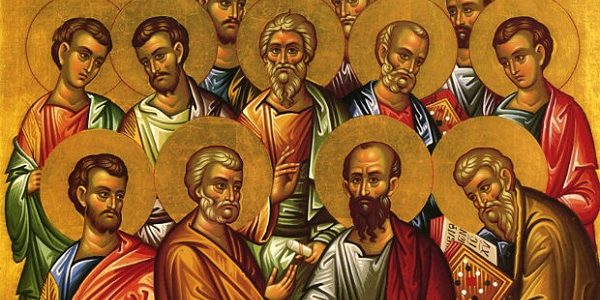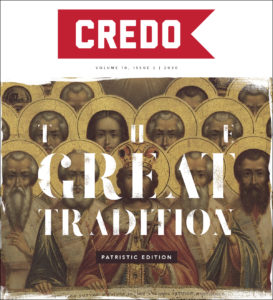
Why Read Early Christian Authors?
 The new issue of Credo Magazine, “The Great Tradition,” focuses on the early Church Fathers. The following is an excerpt from one of the issue’s featured columns by Michael Haykin. Michael Haykin (Th.D., University of Toronto) is the Professor of Church History and Biblical Spirituality and Director of The Andrew Fuller Center for Baptist Studies at the Southern Baptist Theological Seminary. He is the author of numerous books including Rediscovering the Church Fathers: Who They Were and How They Shaped the Church (Crossway, 2011).
The new issue of Credo Magazine, “The Great Tradition,” focuses on the early Church Fathers. The following is an excerpt from one of the issue’s featured columns by Michael Haykin. Michael Haykin (Th.D., University of Toronto) is the Professor of Church History and Biblical Spirituality and Director of The Andrew Fuller Center for Baptist Studies at the Southern Baptist Theological Seminary. He is the author of numerous books including Rediscovering the Church Fathers: Who They Were and How They Shaped the Church (Crossway, 2011).
The truth of the matter is that far too many modern-day Evangelicals are either ignorant of or quite uncomfortable with the Church Fathers. No doubt years of their decrying tradition and battling Roman Catholicism and Eastern Orthodoxy with their “saints” from the Ancient Church have contributed in part to this state of ignorance and unease. Then, certain strains of anti-intellectual Fundamentalism have discouraged an interest in that “far country” of church history. And the strangeness of much of that era of the Ancient Church has proven a barrier to some Evangelicals in their reading about the early centuries of the Church. Finally, an ardent desire to be “people of the Book”—an eminently worthy desire—has also led to a lack of interest in other students of Scripture from that earliest period of the Church’s history after the Apostolic era. Well did Charles Haddon Spurgeon (1834–92)—a man who certainly could not be accused of elevating tradition to the level of, let alone over, Scripture—once note: “It seems odd, that certain men who talk so much of what the Holy Spirit reveals to themselves, should think so little of what he has revealed to others.”[1]
Reading the Church Fathers for Freedom and Wisdom
Why should Evangelical Christians engage the thought and experience of these early Christian witnesses?[2] First, study of the Fathers, like any historical study, liberates us from the present.[3] Every age has its own distinct outlook, presuppositions which remain unquestioned even by opponents. The examination of another period of thought forces us to confront our innate prejudices which would go unnoticed otherwise.
Then, the Fathers can provide us with a map for the Christian life. It is indeed exhilarating to stand on the east coast of North America, watch the Atlantic surf, hear the pound of the waves, and, if close enough, feel the salty spray. But this experience will be of little benefit in sailing to Ireland and the British Isles. For this a map is needed—a map based upon the accumulated experience of thousands of voyagers. Similarly, we need such a map for the Christian life. Experiences are fine and good, but they will not serve as a suitable foundation for our lives in Christ. To be sure, we have the divine Scriptures, an ultimately sufficient foundation for all of our needs as Christians (2 Timothy 3:16–17). But the thought of the Fathers can help us enormously in building on this foundation. The examination of another period of thought forces us to confront our innate prejudices which would go unnoticed otherwise. Click To Tweet
Consider the landmark that has been set up on the landscape of church history by the Niceno-Constantinopolitan Creed, commonly called the Nicene Creed. This document, while by no means infallible, is nevertheless a sure guide to the biblical doctrine of God. It should never be dismissed as being of no value. To do so shows a distinct lack of wisdom and discernment. I vividly recall a conversation in the 1990s with an administrator of an academic institution at which I was teaching. During the conversation the subject of the Nicene Creed was raised and this particular individual remarked cavalierly that there was no way he would be bound by a man-made document like this creed. Honestly, I was horrified by his dismissive approach and considered, and still do, that such a statement to be the height of folly and the sure road to theological disaster.
Reading the Church Fathers so as to Understand the New Testament
Third, the Fathers may also, in some cases, help us to understand the New Testament. We have had too disparaging a view of Patristic exegesis, and have come close to considering the exposition of the Fathers as a consistent failure to understand the New Testament. For instance Cyril of Jerusalem (c.315–387) in his interpretation of 1 Corinthians 7:5, which concerns temporary abstinence of sexual relations between married couples for the sake of prayer, assumes without question that the prayer is liturgical and communal.[4] Cyril may be guilty of an anachronism, for he was a leader in “the hallowing of the time,” that is, the observance of holy seasons. Nonetheless, there is good evidence that such special communal times of prayer, in some form or other, are quite early. The liturgical life of the Church of Jerusalem in the fourth century was not that of Corinth in the first, but nevertheless there were links. Possibly, it is the Protestant commentators who are guilty of anachronism when they assume that Paul meant private prayer. Such religious individualism is more conceivable in the Protestant West than in first-century Corinth.
Again, in recent discussions of the Pauline doctrine of salvation, it has been asserted by the proponents of the so-called “New Perspective” that the classical Reformed view of justification has little foundation in Paul or the rest of the New Testament, but is more a product of the thinking of Martin Luther (1483–1546) and John Calvin. Yet, in the second-century Letter to Diognetus, which we have already referred to, we find the following argument that sounds like it has been lifted straight from the pages of Luther. The author has been arguing that God revealed his plan of salvation to none but his “beloved Son” until human beings realized their utter and complete inability to gain heaven by their own strength. Then, when men were conscious of their sin and impending judgement, God sent his Son, marked in his character by utter sinlessness, to die in the stead of humanity, who are indwelt by radical depravity. What is expressed here is very much in full accord with the classical Reformed view of the meaning of Christ’s death for our salvation.
**Read the remainder of Michael Haykin’s column in the latest issue of Credo Magazine
Endnotes
[1] Commenting and Commentaries (London: Passmore & Alabaster, 1876), 1. Cf. the similar remarks of J.I. Packer: “Tradition . . . is the fruit of the Spirit’s teaching activity from the ages as God’s people have sought understanding of Scripture. It is not infallible, but neither is it negligible, and we impoverish ourselves if we disregard it.” [“Upholding the Unity of Scripture Today”, Journal of the Evangelical Theological Society, 25 (1982), 414].
[2] An earlier version of the next two sections of this article has previously appeared as “Why Study the Fathers?”, Eusebeia: The Bulletin of The Andrew Fuller Center for Baptist Studies, 8 (Fall 2007), 3–7. Used by permission.
[3] C.S. Lewis, “De descriptione temporum” in his Selected Literary Essays, ed. Walter Hooper (Cambridge: Cambridge University Press, 1969), 12.
[4] Catechesis 4.25.

